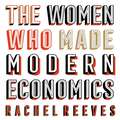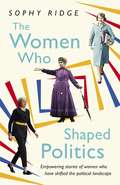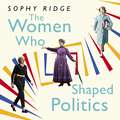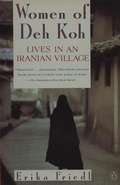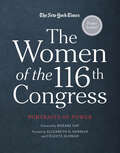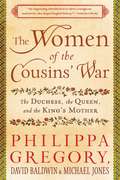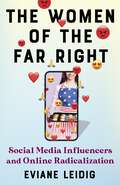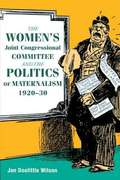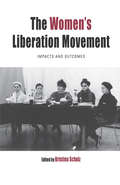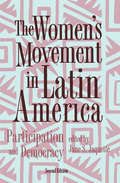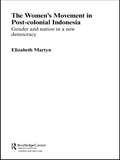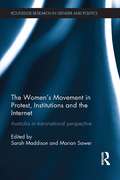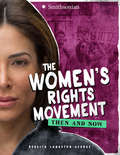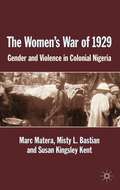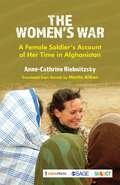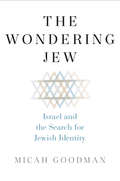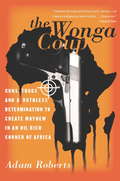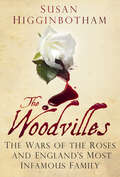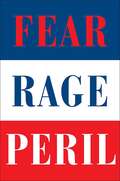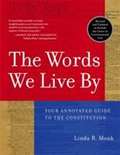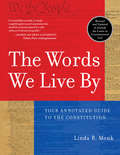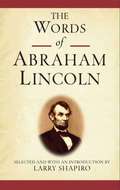- Table View
- List View
The Women Who Made Modern Economics
by Rachel ReevesA powerful call to put the women back into economics and embrace a better future for all.THE WOMEN WHO MADE MODERN ECONOMICS tells the story of the women who for too many years have been locked out of the economy with negative consequences for them and for society as a whole. Economic thinking has also largely ignored what women have to offer, marginalising the work of female economists or simply not recognising their achievements. As a woman and economist who is herself challenging those barriers, Rachel Reeves has written a passionate, powerful and inspiring book dedicated to the women who have gone before and to those who will change the future. Drawing on her personal experiences and relating them to the work of women past and present who are often overlooked, Reeves explores the ideas of theorists such as Harriet Martineau, Mary Paley Marshall and Joan Robinson but also the contributions of policy makers such as Janet Yellen, Gita Gopinath and Christine Lagarde. Throughout, she outlines her vision for the future of the economy if she does become the first female Chancellor of the UK, a future in which productivity is enhanced, growth is sustainable and there are opportunities for all, not just a privileged elite.(P) 2023 Hodder & Stoughton Limited
The Women Who Ruled China: Buddhism, Multiculturalism, and Governance in the Sixth Century
by Stephanie BalkwillA free ebook version of this title is available through Luminos, University of California Press’s Open Access publishing program. Visit www.luminosoa.org to learn more. In the late fifth century, a girl whose name has been forgotten by history was born at the edge of the Chinese empire. By the time of her death, she had transformed herself into Empress Dowager Ling, one of the most powerful politicians of her age and one of the first of many Buddhist women to wield incredible influence in dynastic East Asia. In this book, Stephanie Balkwill documents the Empress Dowager’s rise to power and life on the throne against the broader world of imperial China under the rule of the Northern Wei dynasty, a foreign people from Inner Asia who built their capital deep in the Chinese heartland. Building on largely untapped Buddhist materials, Balkwill shows that the life and rule of the Empress Dowager is a larger story of the reinvention of religious, ethnic, and gender norms in a rapidly changing multicultural society. The Women Who Ruled China recovers the voices of those left out of the mainstream historical record, painting a compelling portrait of medieval Chinese society reinventing itself under the Empress Dowager’s leadership.
The Women Who Shaped Politics: Empowering stories of women who have shifted the political landscape
by Sophy RidgeSophy Ridge, presenter for Sky News, has uncovered the extraordinary stories of the women who have shaped British politics. Never has the role of women in the political world ever been more on the news agenda, and Sophy has interviewed current and former politicians including among others, Nicola Sturgeon, Ruth Davidson, Betty Boothroyd gain exclusive insight into the role women play in politics at the highest level. The book also includes Theresa May's first at-length interview about her journey to becoming Prime Minister. These interviews have revealed the shocking truth about the sexism that is rife among the House of Commons both in the past and today, with sometimes shocking, and sometimes amusing anecdotes revealing how women in Westminster have worked to counter the gender bias. Sophy provides gripping insight into historical and contemporary stories which will fascinate not just those interested in politics but those who want to know more about women's vital role in democracy. From royalty to writers and from class warriors to suffragettes, Sophy tells the story of those who put their lives on the line for equal rights, and those who were the first to set foot inside the chambers of power, bringing together stories that you may think you know, and stories that have recently been discovered to reveal the truth about what it is to be a woman in Westminster. Looking at the different ways that women have shaped government allows Sophy to draw parallels across history and celebrate fascinating women you want to know more about.
The Women Who Shaped Politics: Empowering stories of women who have shifted the political landscape
by Sophy RidgeSophy Ridge, presenter for Sky News, has uncovered the extraordinary stories of the women who have shaped British politics. Never has the role of women in the political world ever been more on the news agenda, and Sophy has interviewed current and former politicians including among others, Nicola Sturgeon, Ruth Davidson, Betty Boothroyd gain exclusive insight into the role women play in politics at the highest level. The book also includes Theresa May's first at-length interview about her journey to becoming Prime Minister. These interviews have revealed the shocking truth about the sexism that is rife among the House of Commons both in the past and today, with sometimes shocking, and sometimes amusing anecdotes revealing how women in Westminster have worked to counter the gender bias. Sophy provides gripping insight into historical and contemporary stories which will fascinate not just those interested in politics but those who want to know more about women's vital role in democracy. From royalty to writers and from class warriors to suffragettes, Sophy tells the story of those who put their lives on the line for equal rights, and those who were the first to set foot inside the chambers of power, bringing together stories that you may think you know, and stories that have recently been discovered to reveal the truth about what it is to be a woman in Westminster. This book is a celebration of the differing ways that women have shaped the political landscape. The book also, importantly, sheds light on the challenges faced by women in government today, telling us the ways that women working in politics battle the sexism that confront them on a daily basis.
The Women Who Shaped Politics: Empowering stories of women who have shifted the political landscape
by Sophy RidgeFrom royalty to suffragettes and from campaigners to contemporary rebels, Sky News Presenter Sophy Ridge explains the ways that women have changed the face of politics.Sophy Ridge, presenter for Sky News, has uncovered the extraordinary stories of the women who have shaped British politics. Never has the role of women in the political world ever been more on the news agenda, and Sophy has interviewed current and former MPs to gain exclusive insight into the role women play in politics at the highest level. The book also includes Theresa May's first at-length interview about her journey to becoming Prime Minister.Sophy provides gripping insight into historical and contemporary stories which will fascinate not just those interested in politics but those who want to know more about women's vital role in democracy. From royalty to writers and from class warriors to suffragettes, Sophy tells the story of those who put their lives on the line for equal rights, and those who were the first to set foot inside the chambers of power, bringing together stories that you may think you know, and stories that have recently been discovered. Looking at the different ways that women have shaped government allows her to draw parallels across history and uncover fascinating women you want to know more about.(P)2017 Hodder & Stoughton
The Women of Deh Koh: Lives in an Iranian Village
by Erika Friedl"Masterful . . . absorbing. This finely written book gives us a whole new sense of Iran. "--The Washington Post Book World While doing research in the Iranian village of Deh Koh, Erika Friedl was able to quietly observe and record the cloistered lives of women in one of the strictest of all Muslim societies. In this fascinating book, Friedl recounts these women's personal stories as they relate the strain of their daily activities, their intricate relationships with men, and their hopes, dreams, and fears. Women of Deh Koh is a rare and vivid look at what life is really like for the women of Iran. "Her intimate understanding of the life and customs of the village has made her confident about conveying her view from the inside. To share this view with us, and to comment quietly and wisely on the scene, is the striking and illuminating achievement of Women of Deh Koh. "--The New York Times Book Review
The Women of the 116th Congress: Portraits of Power
by The New York TimesA photographic celebration of the women of the 116th—the most diverse Congress in American history. The first woman Speaker of the House. The first female combat veteran. The first Native American women. The first Muslim women. The first openly gay member of the Senate. These are just some of the remarkable firsts represented by the women of the 116th Congress, the most diverse and inclusive in American history. Just over a century ago, Jeannette Rankin of Montana was the first and only woman in the House of Representatives. By the time of the 116th Congress, a total of 131 were seated in both chambers. The 2018 midterm elections brought a seismic change—and this book, a collaboration between New York Times photo editors Beth Flynn and Marisa Schwartz Taylor and photographers Elizabeth D. Herman and Celeste Sloman—documents the women of the 116th Congress, photographed in the style of historical portrait paintings commonly seen in the halls of power to highlight the stark difference between how we’ve historically viewed governance and how it has evolved.Also featured are an illustrated timeline and list of firsts for women in Congress; “Her Vote, Her Voice” sections throughout that highlight historical moments in female politics; and an extended introduction and foreword by Roxane Gay. The Women of the 116th Congress is a testament to what representation in the United States looks like in the twenty-first century—and an inspiration for what it may look like in the years to come.
The Women of the Cousins' War: The Duchess, the Queen, and the King's Mother
by Philippa Gregory David Baldwin Michael Jones#1 New York Times bestselling author Philippa Gregory joins two eminent historians to explore the extraordinary true stories of three women largely forgotten by history: Jacquetta, Duchess of Bedford; Elizabeth Woodville, queen of England; and Margaret Beaufort, the founder of the Tudor dynasty.In her essay on Jacquetta, Philippa Gregory uses original documents, archaeology, and histories of myth and witchcraft to create the first-ever biography of the young duchess who survived two reigns and two wars to become the first lady at two rival courts. David Baldwin, established authority on the Wars of the Roses, tells the story of Elizabeth Woodville, the first commoner to marry a king of England for love. And Michael Jones, fellow of the Royal Historical Society, writes of Margaret Beaufort, the almost-unknown matriarch of the House of Tudor. Beautifully illustrated throughout with rare portraits and source materials, The Women of the Cousins' War offers fascinating insights into the inspirations behind Philippa Gregory's fiction and will appeal to all with an interest in this epic period.
The Women of the Far Right: Social Media Influencers and Online Radicalization
by Eviane LeidigOn mainstream social media platforms, far-right women make extremism relatable. They share Instagram stories about organic foods that help pregnant women propagate the “pure” white race and post behind-the-scenes selfies at antivaccination rallies. These social media personalities model a feminine lifestyle, at once promoting their personal brands and radicalizing their followers. Amid discussions of issues like dating, marriage, and family life, they call on women to become housewives to counteract the corrosive effects of feminism and champion the Great Replacement conspiracy theory, which motivated massacres in Christchurch, El Paso, and Buffalo.Eviane Leidig offers an in-depth look into the world of far-right women influencers, exploring the digital lives they cultivate as they seek new recruits for white nationalism. Going beyond stereotypes of the typical male white supremacist, she uncovers how young, attractive women are playing key roles as propagandists, organizers, fundraisers, and entrepreneurs. Leidig argues that far-right women are marketing themselves as authentic and accessible in order to reach new followers and spread a hateful ideology. This insidious—and highly gendered—strategy takes advantage of the structure of social media platforms, where far-right women influencers’ content is shared with and promoted to mainstream audiences. Providing much-needed expertise on gender and the far right, this timely and accessible book also details online and offline approaches to countering extremism.
The Women's Joint Congressional Committee and the Politics of Maternalism, 1920-30 (Women in American History)
by Jan WilsonThe rise and fall of a feminist reform powerhouse This is the first comprehensive history of the Women's Joint Congressional Committee (WJCC), a large umbrella organization founded by former suffrage leaders in 1920 in order to coordinate organized women's reform. Encompassing nearly every major national women's organization of its time, the WJCC evolved into a powerful lobbying force for the legislative agendas of twelve million women, and was recognized by critics and supporters alike as "the most powerful lobby in Washington." Through a close examination of the WJCC's most consequential and contentious campaigns, Jan Doolittle Wilson demonstrates organized women's strategies and initial success in generating congressional and grassroots support for their far-reaching, progressive reforms. By using the WJCC as a lens through which to analyze women's political culture during the 1920s, the book also sheds new light on the initially successful ways women lobbied for social legislation, the inherent limitations of that process for pursuing class-based reforms, and the enormous difficulties faced by women trying to expand public responsibility for social welfare in the years following the Nineteenth Amendment's passage. A volume in the series Women in American History, edited by Anne Firor Scott, Susan Armitage, Susan K. Cahn, and Deborah Gray White
The Women's Liberation Movement: Impacts and Outcomes (Protest, Culture & Society #22)
by Kristina SchulzFor over half a century, the countless organizations and initiatives that comprise the Women's Liberation movement have helped to reshape many aspects of Western societies, from public institutions and cultural production to body politics and subsequent activist movements. This collection represents the first systematic investigation of WLM's cumulative impacts and achievements within the West. Here, specialists on movements in Europe systematically investigate outcomes in different countries in the light of a reflective social movement theory, comparing them both implicitly and explicitly to developments in other parts of the world.
The Women's Movement In Latin America: Participation And Democracy, Second Edition (Thematic Studies In Latin America Ser.)
by Jane JaquetteFor those interested in democratic transition and consolidation, social movements, and gender politics, this volume is the most comprehensive, up-to-date, and probing analysis available of how women's groups are helping to reshape Latin America. The contributors document and assess the remarkable wave of women's political participation in Latin America over the past two decades. The first five case studies, on Brazil, Argentina, Uruguay, Chile, and Peru, examine the origins, evolution, and goals of women's organizations as they worked together to end authoritarian rule and elaborate how women's groups have adapted in the 1990s to the day-to-day realities of democratic politics. In the 1990s, the challenge has shifted from mobilizing opposition to the very different task of working with parties and government bureaucracies in order to maintain and implement their agendas. The chapters on Nicaragua and Mexico broaden our understanding of political transitions.Seven case studies vividly illustrate the variety of women's movements in the region, ranging from the communal-kitchens movements to human rights groups. Each author discusses the strategies and debates of the feminist movements in question and records their political successes and failures. Jaquette's introductory and concluding essays provide a comparative framework, highlighting the innovative ways in which Latin American women are making gender a political issue.
The Women's Movement in Postcolonial Indonesia: Gender and Nation in a New Democracy (ASAA Women in Asia Series)
by Elizabeth MartynThis book examines women's activism in the early years of independent Indonesia when new attitudes to gender, nationalism, citizenship and democratization were forming. It questions the meaning of democratization for women and their relationship to national sovereignty within the new Indonesian state, and discusses women's organizations and their activities; women's social and economic roles; and the different cultural, regional and ethnic attitudes towards women, while showing the failure of political change to fully address women's gender interests and needs. The author argues that both the role of nationalism in defining gender identity and the role of gender in defining national identity need equal recognition.
The Women's Movement in Protest, Institutions and the Internet: Australia in transnational perspective (Routledge Research in Gender and Politics)
by Sarah Maddison Marian SawerThe death of feminism is regularly proclaimed in the West. Yet at the same time feminism has never had such an extensive presence, whether in international norms and institutions, or online in blogs and social networking campaigns. This book argues that the women’s movement is not over; but rather social movement theory has led us to look in the wrong places. This book offers both methodological and theoretical innovations in the study of social movements, and analyses how the trajectories of protest activity and institution-building fit together. The rich empirical study, together with focused research on discursive activism, blogging, popular culture and advocacy networks, provides an extraordinary resource, showing how the women’s movements can survive the highs and lows and adapt in unexpected ways. Expert contributors explore the ways in which the movement is continuing to work its way through institutions, and persists within submerged networks, cultural production and in everyday living, sustaining itself in non-receptive political environments and maintaining a discursive feminist space for generations to come. Set in a transnational perspective, this book trace the legacies of the Australian women’s movement to the present day in protest, non-government organisations, government organisations, popular culture, the Internet and the Slut Walk. The Women’s Movement in Protest, Institutions and the Internet will be of interest to international students and scholars of gender politics, gender studies, social movement studies and comparative politics.
The Women's Rights Movement: Then and Now (America: 50 Years of Change)
by Rebecca Langston-GeorgeDiscusses the main concerns of the womens' movement in the 1960s, and how those have evolved since; what's changed for the better, what might be worse, and where do we go from here.
The Women’s War of 1929
by Marc MateraIn 1929, tens of thousands of south eastern Nigerian women rose up against British authority in what is known as the Women's War. This book brings togther, for the first time, the multiple perspectives of the war's colonized and colonial participants and examines its various actions within a single, gendered analytical frame.
The Women’s War: A Female Soldier’s Account of Her Time in Afghanistan
by Anne-Cathrine RiebnitzskyThe Women′s War is the gripping true story of a Danish female soldier′s tours to the Helmand Province in Afghanistan between 2007 and 2009. There she comes into contact with the Afghan women who are fighting against oppression, domestic violence and the horror regime of the Taliban, and together they initiate a covert collaboration. The women receive the necessary aid to establish dressmaking rooms, beauty salons, chicken farms and other projects while being aware of the fact that the international military forces are their only chance to get rid of the Taliban. The Women′s War emerged out of the friendships built by a soldier with Afghan women who helped the international military forces in unexpected ways. It is a book by a woman in the armed forces about what war does to women, about the looming risk of taking chances in wartime and about grief over fallen friends, but more importantly, it is about how women in one instance found the will to not only survive but to make something out of the terrible conditions that war brings.
The Wondering Jew: Israel and the Search for Jewish Identity
by Micah GoodmanA celebrated Israeli author explores the roots of the divide between religion and secularism in Israel today, and offers a path to bridging the divide Zionism began as a movement full of contradictions, between a pull to the past and a desire to forge a new future. Israel has become a place of fragmentation, between those who sanctify religious tradition and those who wish to escape its grasp. Now, a new middle ground is emerging between religious and secular Jews who want to engage with their heritage—without being restricted by it or losing it completely. In this incisive book, acclaimed author Micah Goodman explores Israeli Judaism and the conflict between religion and secularism, one of the major causes of political polarization throughout the world. Revisiting traditional religious sources and seminal works of secularism, he reveals that each contains an openness to learn from the other’s messages. Goodman challenges both orthodoxies, proposing a new approach to bridge the divide between religion and secularism and pave a path toward healing a society torn asunder by extremism.
The Wonga Coup: Guns, Thugs, and a Ruthless Determination to Create Mayhem in an Oil-Rich Corner of Africa
by Adam RobertsEquatorial Guinea is a tiny country roughly the size of the state of Maryland. Humid, jungle covered, and rife with unpleasant diseases, natives call it Devil Island. Its president in 2004, Obiang Nguema, had been accused of cannibalism, belief in witchcraft, mass murder, billiondollar corruption, and general rule by terror. With so little to recommend it, why in March 2004 was Equatorial Guinea the target of a group of salty British, South African and Zimbabwean mercenaries, travelling on an American-registered ex-National Guard plane specially adapted for military purposes, that was originally flown to Africa by American pilots? The real motive lay deep below the ocean floor: oil. In The Dogs of War, Frederick Forsyth effectively described an attempt by mercenaries to overthrow the government of Equatorial Guinea - in 1972. And the chain of events surrounding the night of March 7, 2004, is a rare case of life imitating art-or, at least, life imitating a 1970s thriller-in almost uncanny detail. With a cast of characters worthy of a remake of Wild Geese and a plot as mazy as it was unlikely, The Wonga Coup is a tale of venality, overarching vanity and greed whose example speaks to the problems of the entire African continent.
The Woodvilles: The Wars of the Roses and England's Most Infamous Family
by Susan HigginbothamIn 1464, the most eligible bachelor in England, Edward IV, stunned the nation by revealing his secret marriage to Elizabeth Woodville, a beautiful, impoverished widow whose father and brother Edward himself had once ridiculed as upstarts. Edward’s controversial match brought his queen’s large family to court and into the thick of the Wars of the Roses. This is the story of the family whose fates would be inextricably intertwined with the fall of the Plantagenets and the rise of the Tudors: Richard, the squire whose marriage to a duchess would one day cost him his head; Jacquetta, mother to the queen and accused witch; Elizabeth, the commoner whose royal destiny would cost her three of her sons; Anthony, the scholar and jouster who was one of Richard III’s first victims; and Edward, whose military exploits would win him the admiration of Ferdinand and Isabella.
The Woodward Trilogy: Fear, Rage, and Peril
by Bob Woodward Robert CostaDiscover the inside story of life inside President Trump&’s White House as only #1 internationally bestselling author Bob Woodward can tell it with this collection of Woodward&’s most revealing and unprecedented works including Fear, Rage, and Peril.With authoritative reporting, internationally bestselling author Bob Woodward offers an exposing and riveting account of President Trump&’s term in office—from the beginning to the final transfer of power to President Biden&’s administration. In vivid detail, Woodward paints the most intimate portrait of a sitting president ever published in this complete trilogy following the Trump presidency. This collection includes: Fear: An &“explosive&” (The Washington Post) and &“devastating&” (The New Yorker) look at the harrowing life inside President Donald Trump&’s White House and precisely how he makes decisions on major foreign and domestic policies. Fear is the inside story on President Trump as only Bob Woodward can tell it, drawing from hundreds of hours of interviews with firsthand sources, meeting notes, personal diaries, files, and documents. Rage: An unprecedented and intimate tour de force of reporting on the Trump presidency facing a global pandemic, economic disaster, and racial unrest. In dramatic detail, Woodward has uncovered the precise moment the president was warned that the Covid-19 epidemic would be the biggest national security threat to his presidency. Peril: The book covers the end of the Trump presidency and the early months of the Biden presidency.
The Words That Built America
by Georgia Department of EducationThis collection of documents creates civic awareness, and an understanding of the values that make America great.
The Words We Live By: Your Annotated Guide to the Constitution
by Linda R. MonkFrom the book: In this book, you will hear the voices of America's founders and fanatics, of Supreme Court justices and civil rights workers. Among this cacophony are rock star Ted Nugent, first-grader Ruby Bridges, actor Charlton Heston, gay rights activist Michael Hardwick, ex-con Clarence Earl Gideon, and pro-life protester Norma McCorvey. As these stories prove, the Constitution is not self-enforcing and depends upon citizens for its support. Judge Learned Hand emphasized this fact during World War II: I often wonder whether we do not rest our hopes too much upon constitutions, upon laws, and upon courts. These are false hopes; believe me, these are false hopes, liberty lies in the hearts of men and women; when it dies there, no constitution, no law, no court can save it. For the Constitution to have meaning, it must be not only the words we recite, but also the words we live by. [This text is listed as an example that meets Common Core Standards in English language arts in grades 6-8 at http://www.corestandards.org.]
The Words We Live By: Your Annotated Guide to the Constitution
by Linda R. Monk<P>THE WORDS WE LIVE BY takes an entertaining and informative look at America's most important historical document, now with discussions on new rulings on hot button issues such as immigration, gay marriage, gun control, and affirmative action. <P>In THE WORDS WE LIVE BY, Linda Monk probes the idea that the Constitution may seem to offer cut-and-dried answers to questions regarding personal rights, but the interpretations of this hallowed document are nearly infinite. For example, in the debate over gun control, does "the right of the people to bear arms" as stated in the Second Amendment pertain to individual citizens or regulated militias? What do scholars say? Should the Internet be regulated and censored, or does this impinge on the freedom of speech as defined in the First Amendment? These and other issues vary depending on the interpretation of the Constitution. <P>Through entertaining and informative annotations, THE WORDS WE LIVE BY offers a new way of looking at the Constitution. Its pages reflect a critical, respectful and appreciative look at one of history's greatest documents. THE WORDS WE LIVE BY is filled with a rich and engaging historical perspective along with enough surprises and fascinating facts and illustrations to prove that your Constitution is a living--and entertaining--document. <P>Updated now for the first time, THE WORDS WE LIVE BY continues to take an entertaining and informative look at America's most important historical document, now with discussions on new rulings on hot button issues such as immigration, gay marriage, and affirmative action.
The Words of Abraham Lincoln
by Abraham LincolnFrom the "Four score and seven years ago" that every American schoolchild knows to personal notes and dozens of memorable letters, debates, and speeches from a critical time in this nation's history, here is a remarkable collection of Lincoln's writings. Through them, we can follow the sixteenth president's development from country lawyer to healer of a wounded nation. Arranged thematically, The Words of Abraham Lincoln brings together his early writings, his notes on courtship, marriage, and the family, his thoughts on slavery, including the full text of the Emancipation Proclamation, and his letters to his generals during the Civil War, among other subjects. This book includes eight historical photographs and a chronology. Two hundred years after his birth, Lincoln's writing endures. Witty and wise, Lincoln speaks today as powerfully as he did when he was president.
